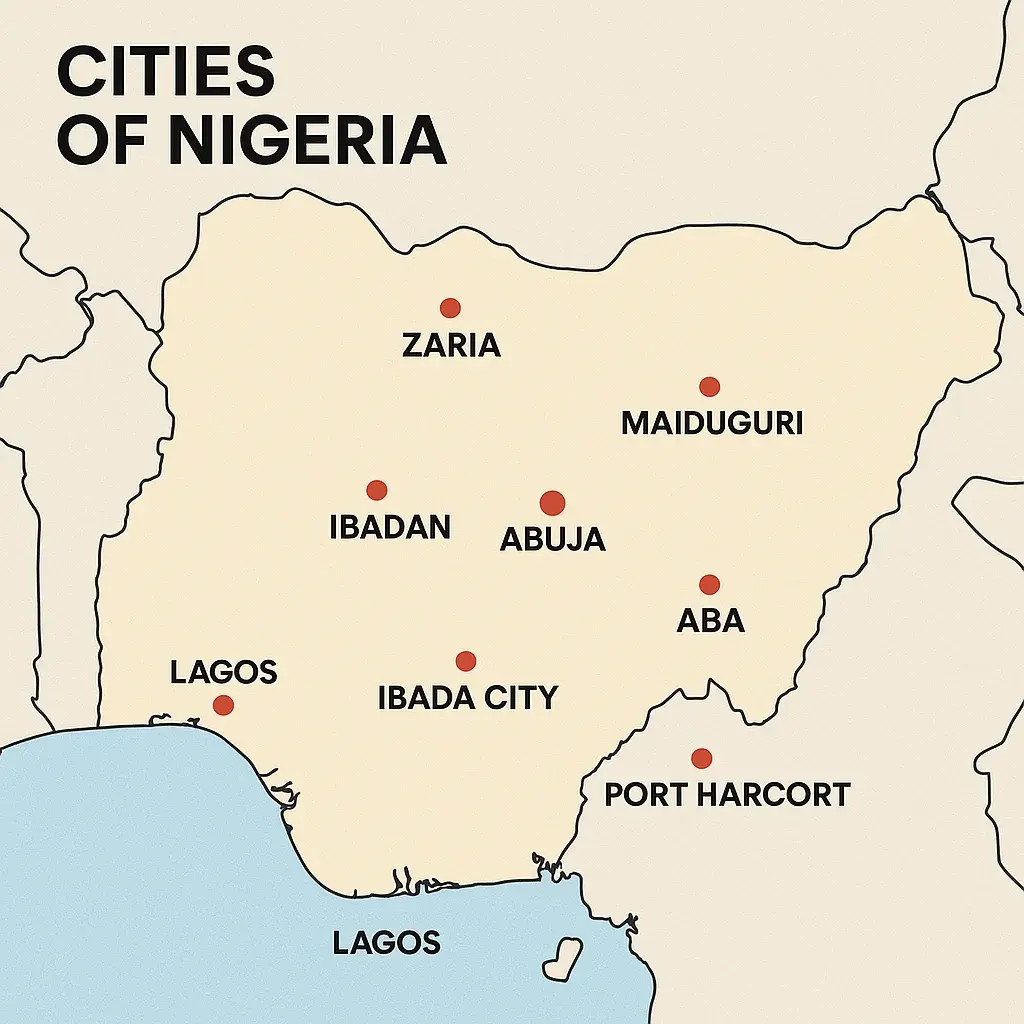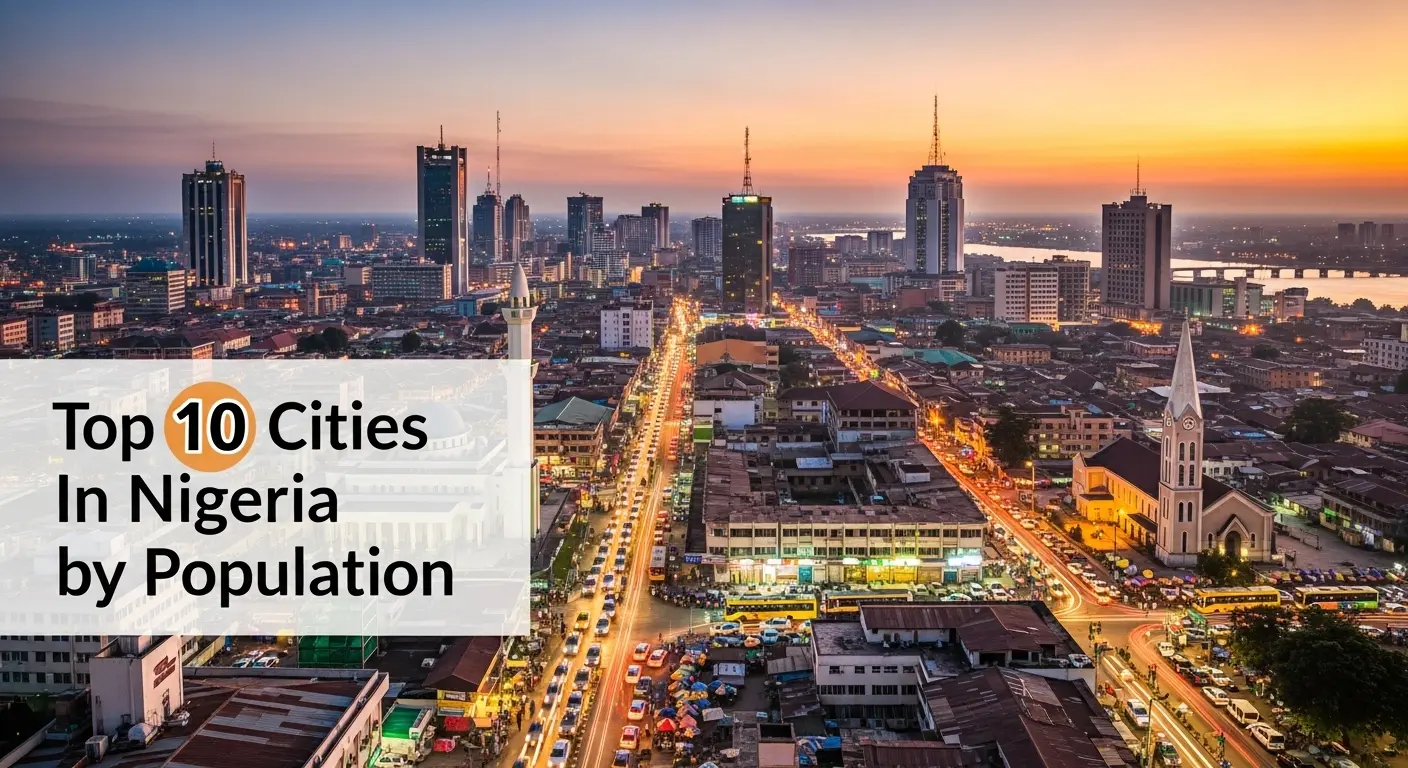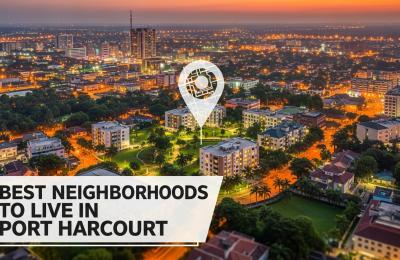Discover Your Dream Home with Our Latest Listings and Personalized Services!
Explore Our Exciting New Property Listings Now Available in Prime Locations!
Join Us for Exclusive Open House Events This Weekend and Find Your Perfect Home!
Take Advantage of Limited-Time Offers on Luxury Homes with Stunning Features!
Top 10 Cities in Nigeria by Population: See What Makes Each One Unique
Nigeria, often hailed as the "Giant of Africa," truly lives up to its name. It's a nation pulsating with a vibrant tapestry of cultures, over 250 diverse ethnic groups, and an economy that continues to expand, making it a pivotal player on the continent. With a staggering population exceeding 220 million people (as of recent 2024/2025 estimates, a figure that continues to grow rapidly), it's no surprise that Nigeria's cities are among the largest, most dynamic, and influential urban centres in Africa.
In this comprehensive post, we'll embark on a journey through the top 10 cities in Nigeria by population, unveiling the distinct characteristics that make each one unique. Whether you're planning a trip, considering relocation for work or family, or seeking new business opportunities, understanding the diverse landscape of these Nigerian cities is crucial for making informed decisions.
Note: This list ranks cities primarily by their estimated population size within their metropolitan areas, not necessarily their total landmass. Population figures are dynamic and represent the most recent available estimates.
Map of Nigeria with Highlighted Cities

Top 10 Most Populated Cities in Nigeria
Each city on this list is more than just a cluster of buildings; it's a living, breathing hub of culture, commerce, government, and innovation, collectively contributing to Nigeria’s accelerating reputation as a rising global power.
Lagos
- Estimated Population: ~17.1 million (Metropolitan Lagos, as per 2025 estimates by sources like Nairametrics, though local estimates often exceed 20 million, making it Africa's most populous city).
- Region: South West
- Known For: Nigeria's undisputed economic powerhouse, a vibrant tech and startup hub, the heart of the country's entertainment (Nollywood) and music industries, and a city famed for its energetic nightlife. It boasts the second-highest GDP in Africa.
- Unique Essence: Lagos is a city of relentless energy and boundless opportunities. It's a major financial center and home to one of Africa's largest and busiest seaports. Its unique geography, spread across islands and mainland areas connected by bridges, contributes to its bustling, fast-paced character.
- Fun Fact: Despite being Nigeria’s smallest state by landmass, Lagos Stateis the most populated and economically active, often referred to as a "mega-city" and one of the fastest-growing urban areas globally.
Kano
- Estimated Population: ~3.6 million (2025 estimate).
- Region: North West
- Known For: An ancient trading centre with a rich history, significant for its textile and agricultural industries (especially groundnuts and hides), and a major hub for Islamic scholarship.
- Unique Essence: Kano is a city that beautifully blends ancient traditions with modern commerce. It's famous Kurmi Market, established in the 15th century, is one of Africa's largest and oldest, still bustling with activity. The city's ancient walls and the Emir's Palace are enduring symbols of its powerful historical emirate.
- Fun Fact: Kano has one of the oldest city walls in Africa, parts of which date back over a thousand years, reflecting its long history as a trans-Saharan trade nexus. The Durbar Festival, celebrated during Eid, is a magnificent cultural spectacle.
Ibadan
- Estimated Population: ~3.5 million (2025 estimate).
- Region: South West
- Known For: A historical and cultural stronghold, a prominent educational hub, and famously known as the "City of Brown Roofs" due to its sprawling, traditional architecture.
- Unique Essence: Ibadan holds the distinction of being the largest city in West Africa by geographical area. It was a crucial administrative centre during the colonial era and remains a significant hub for trade and agriculture. It's laid-back pace offers a stark contrast to Lagos, making it appealing for those seeking a balance of urban amenities and a calmer lifestyle.
- Fun Fact: Ibadan is home to Nigeria’s first university, the University of Ibadan (established 1948), and also boasts Africa's first television station (NTA Ibadan, 1959).
Abuja
- Estimated Population: ~3 million (within the Federal Capital City area, though the broader FCT has a larger, rapidly growing population).
- Region: North Central
- Known For: The political capital of Nigeria, renowned for its modern infrastructure, well-planned layout, and a multitude of embassies and international organisations.
- Unique Essence: Abuja is a purpose-built capital, designed in the 1980s to foster national unity. Its wide boulevards, impressive public buildings, and numerous green spaces make it one of Africa's most aesthetically pleasing cities. It's a melting pot of Nigeria's diverse ethnic groups, reflecting the nation's aspirations for unity.
- Fun Fact: Abuja was meticulously planned and constructed in the 1980s to officially replace Lagos as Nigeria's capital in 1991, signifying a shift towards a more centrally located and neutral administrative centre.
Port Harcourt
- Estimated Population: ~1.1 million (2025 estimate, within the city proper).
- Region: South South
- Known For: The epicentre of Nigeria's oil and gas industry, often referred to as the "Garden City" for its greenery and planned layout.
- Unique Essence: Port Harcourt is a vital economic hub for the Niger Delta region, with numerous oil and gas companies, refineries, and related industries. Despite its industrial focus, it maintains a vibrant social scene, with a growing hospitality sector and notable green spaces. Its strategic location near the coast makes it a significant river port.
- Fun Fact: Nicknamed “The Garden City” due to its planned layout and abundant green areas, a legacy from its colonial origins as a port for coal export. The annual CARNIRIV (Rivers State Carnival) is a major cultural event
Benin City
- Estimated Population: ~1.1 million (2025 estimate).
- Region: South South
- Known For: Its immensely rich history as the capital of the powerful ancient Benin Kingdom, globally recognised for its exquisite Benin bronze artworks and elaborate royal traditions.
- Unique Essence: Benin City is a living museum of pre-colonial African civilisation. The legacy of the Oba of Benin, the intricate bronze castings (many now housed in museums worldwide), and the historic moats that once protected the kingdom speak to its profound cultural significance. It's a city where ancient traditions are still deeply woven into modern life.
- Fun Fact: Benin City was one of the first African cities south of the Sahara to engage in significant trade with Europeans in the 15th century, centuries before formal colonisation.
Maiduguri
- Estimated Population: ~1.1 million (2025 estimate).
- Region: North East
- Known For: A historically important trade route city, known for its vibrant cultural diversity, and as the capital of Borno State.
- Unique Essence: Maiduguri, locally called Yerwa (meaning "blessed land"), is a melting pot of various ethnic groups, including the Kanuri, Hausa, Shuwa Arab, and others, reflecting its strategic position as a crossroads for trans-Saharan trade. Despite facing security challenges in recent years, the city exhibits remarkable resilience and remains a crucial administrative and commercial centre in Nigeria's North-East.
- Fun Fact: Maiduguri was established as a military outpost by the British in 1907, but grew rapidly due to its strategic importance in the region, building on the legacy of the ancient Kanem-Bornu Empire.
Zaria
- Estimated Population: ~975,000 (2025 estimate).
- Region: North West
- Known For: A prominent centre for agriculture, education, and textile production, and another historic emirate city in Northern Nigeria.
- Unique Essence: Zaria is a significant intellectual and agricultural hub. It houses Ahmadu Bello University (ABU), one of Nigeria's largest and most prestigious universities, contributing significantly to its academic landscape. The city retains much of its ancient Hausa architecture and cultural heritage.
- Fun Fact: Zaria is named after Queen Amina of Zazzau, a legendary 16th-century warrior queen who expanded the Zazzau Kingdom's territory and influence, making it a powerful trading state.
Aba
- Estimated Population: ~897,000 (2025 estimate).
- Region: South East
- Known For: A bustling commercial nerve centre and a hub of small and medium-scale manufacturing and local industries, particularly known for its footwear, textiles, and fabricated goods.
- Unique Essence: Aba is famously known for its entrepreneurial spirit and local ingenuity, embodying the "Made in Aba" philosophy, which signifies quality local production. It's a vibrant commercial city with massive markets like Ariaria International Market, attracting traders from across West Africa.
- Fun Fact: Aba gained historical significance as the site of the 1929 Aba Women's Riot, a pivotal anti-colonial protest led by Igbo women. It's often referred to as the "Japan of Africa" due to its vibrant manufacturing sector.
Jos
- Estimated Population: ~816,000 (2025 estimate).
- Region: North Central
- Known For: Its unique cool weather, mining history (especially tin), beautiful landscapes, and growing potential as a tourism destination.
- Unique Essence: Situated on the Jos Plateau, the city offers a distinct climate, significantly cooler than most parts of Nigeria, making it a popular retreat. Its landscape features unique rock formations and waterfalls, remnants of its volcanic past. It's also known for its diverse ethnic mix and its history of tin mining.
- Fun Fact: Jos has some of the coldest temperatures in Nigeria, earning it the nickname "J-Town" and making it a preferred destination for those seeking respite from the heat, and it's home to some of Nigeria's most significant archaeological finds from the ancient Nok culture.
Why These Cities Matter: Beyond Just Population
These top 10 cities are not merely population centres; they are dynamic engines driving Nigeria's progress and embodying its rich heritage:
- Economic Drivers: Cities like Lagos and Port Harcourt are the undisputed powerhouses of Nigeria's economy, dominating the financial, oil, and manufacturing landscapes. Kano and Aba are critical commercial and industrial hubs, especially for local production and trade.
- Cultural Centres: Benin City stands as a testament to ancient kingdoms, while Kano and Ibadan actively preserve and promote rich Nigerian heritage through their traditions, markets, and historical sites.
- Educational Hubs: Ibadan (University of Ibadan), Zaria (Ahmadu Bello University), and Abuja (numerous federal institutions) lead in academic infrastructure and research, nurturing future generations.
- Tourist Spots: Jos (with its cool climate and rock formations), Benin City (historical artefacts), and Abuja (modern architecture and national monuments like Aso Rock and Millennium Park) offer diverse scenic attractions and deep historical insights, attracting both local and international visitors.
- Regional Influence: Each city serves as a critical administrative and commercial centre for its respective geopolitical zone, shaping regional development and connecting disparate parts of the country.
Conclusion
Nigeria’s cities are far more than just numbers on a map; they are vibrant, living, breathing centres of immense growth, innovation, and history. From the frantic pace of Lagos to the ancient tranquillity of Kano, and the planned modernity of Abuja, each city tells a unique story of Nigeria's past, present, and future.
Whether you’re planning to move, invest, explore, or simply learn more about this fascinating country, understanding the diverse cities of Nigeria helps you appreciate the complexity, beauty, and immense potential of this dynamic nation. They are testaments to Nigeria's resilience, diversity, and its undeniable position as the Giant of Africa.




